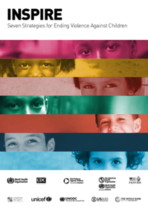The members of the INSPIRE Community of Practice are individual representatives actively implementing or interested in implementing INSPIRE-related programs to end violence against children from the following constituencies: Academia, Bi- and Multi-lateral agencies, Consortia/Partnerships, CSOs/NGOs, Government bodies and Philanthropic Foundations. Due to overwhelming interest in the membership, there is no size limit.
INSPIRE: Seven Strategies for ending Violence Against Children is an evidence-based technical package to support countries in their efforts to prevent and respond to violence against children aged 0-17 years. The package includes the core document describing what the INSPIRE strategies and interventions are; an implementation handbook that provides details on how to implement the interventions, and a set of indicators to measure the uptake of INSPIRE and its impact on levels of violence against children. The strategies will advance efforts to achieve Sustainable Development Goal target 16.2 to end all forms of violence against children.
INSPIRE Working Group and Community of Practice is chaired by the World Health Organization (WHO) and the Care and Protection of Children (CPC) Learning Network at Columbia University and managed by a small Secretariat that also includes the Global Partnership to End Violence Against Children, Centres for Disease Control and Prevention (CDC) and UNICEF. The Secretariat convenes meetings and the Coordinator supports overall objectives of the group.
Where they operate
Organization Type
Main Areas of Work
What They Do
The INSPIRE Implementation Working Group serves as the voice and decision-making arm of the community of practice and provides leadership and strategic guidance in the implementation of INSPIRE-related interventions.
Organization Resources
INSPIRE is an evidence-based resource for everyone committed to preventing and responding to violence against children and adolescents. It represents a select group of strategies based on the best available evidence to help countries and communities intensify their focus on the prevention programmes and services with the greatest potential to reduce violence against children.

